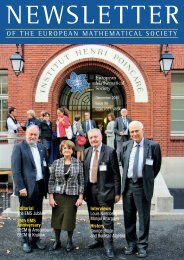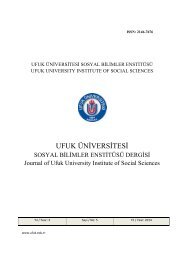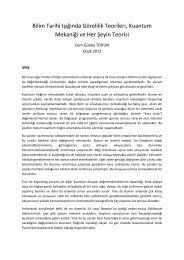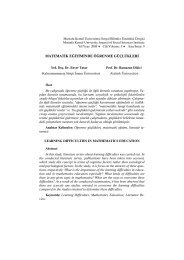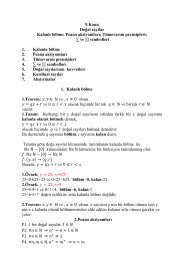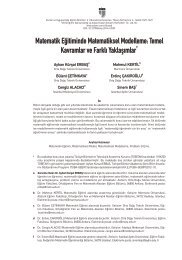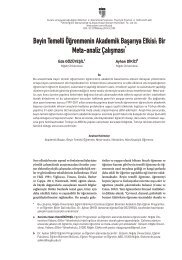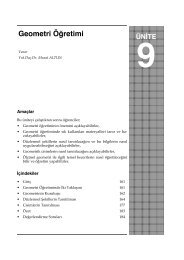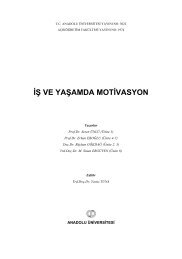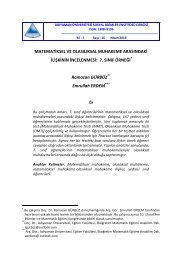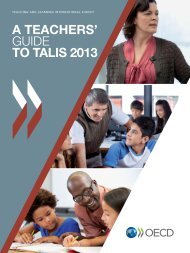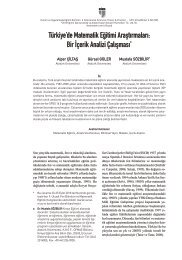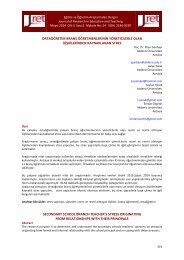bd798f7e557c386e7e231ced888acec57061
bd798f7e557c386e7e231ced888acec57061
bd798f7e557c386e7e231ced888acec57061
- No tags were found...
Create successful ePaper yourself
Turn your PDF publications into a flip-book with our unique Google optimized e-Paper software.
EDUCATIONAL SCIENCES: THEORY & PRACTICE<br />
data. According to Lincoln and Guba (1985), peer<br />
review is a kind of external control mechanism for<br />
the research reliability. Thus, major and sub-categories<br />
created by the researcher were sent to two<br />
separate researchers, one of whom has a PhD degree<br />
in mathematics education and the other holds<br />
a PhD degree in science education. In the light of<br />
expert opinions, sub-categories were modified. For<br />
example, the researcher placed the value “respect/<br />
care student” either in the category of “flexibility/<br />
authority” or as a separate category. However, the<br />
expert in mathematics education suggested that<br />
this value should be placed as a sub-category in<br />
the category of “flexibility/authority” by emphasizing<br />
the expression way of teachers’ opinions. As a<br />
result, the researcher placed the aforementioned<br />
value in this category. Once all the categories were<br />
examined, the concordance correlation coefficient<br />
between the researcher and experts in mathematics<br />
education and science education were calculated as<br />
0.90 and 0.86 respectively.<br />
Findings<br />
After data analysis, a total of four categories of<br />
values emerges. These categories are productivity,<br />
socialization, flexibility/authority, and gender differences.<br />
These categories of values are explained<br />
in detail below:<br />
Productivity<br />
In this study, the following definitions in relation<br />
to this category were taken into account: (1) “outcome,<br />
yield, performance of something that are<br />
operated, run or raised (Türk Dil Kurumu/Turkish<br />
Language Institute [TDK], (1998, p. 2342); (2)<br />
“Produkte hervorbringend” WAHRIG Deutsches<br />
Wörterbuch [WDW], 2006, p. 1169). The opinions<br />
of both Turkish teachers and German teachers<br />
regarding the category of productivity fell under<br />
the two sub-categories “student-oriented and<br />
instructional objective-oriented values”. But, the<br />
values in these sub-categories differed according to<br />
the countries. For Turkish mathematics teachers,<br />
student-oriented values were motivation, awarding,<br />
willing to study, good comprehension, effective<br />
learning, able to succeed, neatness, and focus<br />
on study whereas instructional objective-oriented<br />
values were objective achievement, expediency,<br />
and economy. As for German teachers, studentoriented<br />
value was only deep understanding while<br />
instructional objective-oriented values were organization,<br />
planning, interactive learning and optimum<br />
outcome formation.<br />
Herein, Turkish mathematics teachers (11 open<br />
coding) stress the category of productivity more<br />
than their German colleagues (5 open coding). To<br />
exemplify, T3 works at a primary school and has<br />
a 7-year-teaching experience. T3 emphasized the<br />
student-oriented values and indicated the importance<br />
of respecting student and guiding students<br />
to study. In this case, it can be argued that the underlying<br />
values of T3’s decision making process in<br />
forming study groups were the student-oriented<br />
values “focus on study” and “able to succeed” in the<br />
category of productivity. Moreover, it can be stated<br />
that the value “respect/care student” was important<br />
to T3. On the other hand, G6 works at a secondary<br />
school (Gymnasium) as a mathematics teacher and<br />
has a 13-year-teaching experience. Her/his second<br />
major is physics. S/he is authorized to teach mathematics<br />
and physics until the 10th grade. During the<br />
interview, G6 had an intimate and friendly attitude<br />
and voiced her/his views openly. Within T3’s decision<br />
making process during forming study groups,<br />
the underlying value was ascertained as instructional<br />
objective-oriented value “optimum outcome<br />
formation”. Furthermore, in this process, the value<br />
“collaboration” was also an important value for G6.<br />
Socialization<br />
This study defines socialization through the following<br />
definitions of WDW (2006) “allmähliches<br />
Hineinwachsen des Menschen in die Gesellschaft”<br />
(p. 1377) and TDK (1998) “to educate to behave according<br />
to the society norms” (p. 2015). Thus, the<br />
category of socialization can be regarded as societal<br />
values, as well. For both groups of teachers, societal<br />
values play almost equally effective role in their decision<br />
making processes in group studies (10 open<br />
coding for Turkish teachers and 9 open coding for<br />
German teachers). Nonetheless, it is important to<br />
note that societal values differed according to the<br />
countries. For Turkish teachers, societal values<br />
included collaboration, idea exchange, discussion,<br />
cooperation, sharing, partnership, integration,<br />
socialization, adaptation, and loving. For German<br />
teachers, collaboration, responsibility, cooperation,<br />
sharing, teamwork, respect, broadmindedness, dialogue,<br />
and consensus constituted societal values.<br />
Herein, cooperation, sharing, and collaboration<br />
were the common values for the both groups. For<br />
example, T4 works at a primary school as a mathematics<br />
teacher. S/he has 27 years of teaching and<br />
20 years of administration. During the interview,<br />
T4 behaved in a confident, mature, calm and authoritarian<br />
manner and expressed her/his opinions<br />
698




